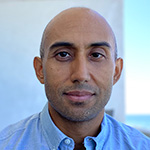Speakers
 Christine Mitchell is the program director of the Health Instead of Punishment program at Human Impact Partners, a national public health nonprofit headquartered in Berkeley, CA. She is an organizer with the Boston-based DeeperThanWater Coalition and a co-author of the American Public Health Association policy statements on law enforcement violence and carceral systems. She has a Master of Divinity from Harvard Divinity School and a Doctor of Science in Social and Behavioral Sciences from Harvard T.H. Chan School of Public Health.
Christine Mitchell is the program director of the Health Instead of Punishment program at Human Impact Partners, a national public health nonprofit headquartered in Berkeley, CA. She is an organizer with the Boston-based DeeperThanWater Coalition and a co-author of the American Public Health Association policy statements on law enforcement violence and carceral systems. She has a Master of Divinity from Harvard Divinity School and a Doctor of Science in Social and Behavioral Sciences from Harvard T.H. Chan School of Public Health.
 Carlos Martinez is Assistant Professor of Latin American & Latino Studies at UC Santa Cruz. He received his PhD from the Joint Program in Medical Anthropology at UC San Francisco and UC Berkeley. At UCSF he was affiliated with the Department of Humanities & Social Sciences and at UC Berkeley he was affiliated with the Department of Anthropology. He received his Master of Public Health degree from San Francisco State University’s Department of Public Health. His teaching emphasizes the political and health inequalities structuring our society and ways that communities enact change. His research lies at the intersection of medical anthropology, public health, and Latinx/Latin American studies. In its various manifestations, his research examines the health consequences and sociocultural implications of migrant policing, deportation, our fractured asylum system, environmental injustice, and the global War on Drugs. He is the co-editor of the forthcoming book, All This Safety Is Killing Us: Health Justice Beyond Prisons, Police, and Borders—Abolitionist Frameworks and Practices from Clinicians, Organizers, and Incarcerated Activists. His current book project, Captive States: Migration and Expulsion on the Carceral Frontier, ethnographically examines how the U.S. deportation regime and asylum deterrence policies have transformed the U.S.-Mexico borderland region into a zone of captivity for asylum seekers and deportees.
Carlos Martinez is Assistant Professor of Latin American & Latino Studies at UC Santa Cruz. He received his PhD from the Joint Program in Medical Anthropology at UC San Francisco and UC Berkeley. At UCSF he was affiliated with the Department of Humanities & Social Sciences and at UC Berkeley he was affiliated with the Department of Anthropology. He received his Master of Public Health degree from San Francisco State University’s Department of Public Health. His teaching emphasizes the political and health inequalities structuring our society and ways that communities enact change. His research lies at the intersection of medical anthropology, public health, and Latinx/Latin American studies. In its various manifestations, his research examines the health consequences and sociocultural implications of migrant policing, deportation, our fractured asylum system, environmental injustice, and the global War on Drugs. He is the co-editor of the forthcoming book, All This Safety Is Killing Us: Health Justice Beyond Prisons, Police, and Borders—Abolitionist Frameworks and Practices from Clinicians, Organizers, and Incarcerated Activists. His current book project, Captive States: Migration and Expulsion on the Carceral Frontier, ethnographically examines how the U.S. deportation regime and asylum deterrence policies have transformed the U.S.-Mexico borderland region into a zone of captivity for asylum seekers and deportees.
 David Fathi is Director of the American Civil Liberties Union National Prison Project, which brings challenges to conditions of confinement in prisons, jails, and other detention facilities, and works to end the policies that have given the United States the highest incarceration rate in the world. He worked as a staff lawyer at the Project for more than ten years before becoming director in 2010, and has special expertise in challenging “supermax” prisons, where prisoners are held for months or years at a time in conditions of near-total isolation. From 2012 to 2015 he represented the ACLU in negotiations leading to adoption of the United Nations Revised Standard Minimum Rules for the Treatment of Prisoners, known as the “Nelson Mandela Rules.”
David Fathi is Director of the American Civil Liberties Union National Prison Project, which brings challenges to conditions of confinement in prisons, jails, and other detention facilities, and works to end the policies that have given the United States the highest incarceration rate in the world. He worked as a staff lawyer at the Project for more than ten years before becoming director in 2010, and has special expertise in challenging “supermax” prisons, where prisoners are held for months or years at a time in conditions of near-total isolation. From 2012 to 2015 he represented the ACLU in negotiations leading to adoption of the United Nations Revised Standard Minimum Rules for the Treatment of Prisoners, known as the “Nelson Mandela Rules.”
 Shamsher Samra, MD, MPhil is Assistant Professor of Emergency Medicine at Harbor UCLA and co-Chair of the Structural Racism and Health Equity Theme at UCLA School of Medicine. He is a member of Frontline Wellness Network -a grassroots organization of care workers committed to improving health and systems of care through decarceration. He is the former medical director of the Whole Person Care Reentry Program and currently supports Los Angeles County Department of Health Service in implementation of the 1115 Medicaid reentry waiver. He is the co-founder the Safe Harbor Violence Intervention Program and Trauma Recovery Center at Harbor UCLA Medical Center.
Shamsher Samra, MD, MPhil is Assistant Professor of Emergency Medicine at Harbor UCLA and co-Chair of the Structural Racism and Health Equity Theme at UCLA School of Medicine. He is a member of Frontline Wellness Network -a grassroots organization of care workers committed to improving health and systems of care through decarceration. He is the former medical director of the Whole Person Care Reentry Program and currently supports Los Angeles County Department of Health Service in implementation of the 1115 Medicaid reentry waiver. He is the co-founder the Safe Harbor Violence Intervention Program and Trauma Recovery Center at Harbor UCLA Medical Center.
This post was originally published on this site be sure to check out more of their content.






